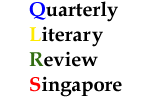|
eddietay
Singapore
5 Posts |
 Posted - 08 Sep 2005 : 20:46:31 Posted - 08 Sep 2005 : 20:46:31



|
OK, here's a long one ... 'cos the moment I say one thing I realised I have to backtrack and explain a bit ... so it's longwinded ...
I was at _Wings of Summer_. It's a talk given by Zheng Danyi, a judge of the Chinese segment of the GoldenPoint Award, and his translator, Luo Hui.
Danyi is originally from Sichuan and is now based in Hong Kong. I've read beside him and have been to Guangzhou for a poetry festival with him, and I've met Luo Hui in Hong Kong at a friend's place.
The Chinese-English bilingual edition of his book, Wings of Summer, is the summation of Danyi's poetic career. The translation is by Luo Hui, originally from China but currently based in Toronto, is a study in mediation between translation and interpretation. There’s a general agreement that Danyi is one of the notable Chinese poets after the generation of Duo Duo, Bei Dao and Shu Ting.
Danyi is an angry reader. His poems are passionate yet violent. Though I’ve heard him read many times, I’ve never heard him talk at length about his own writing. So the session at SWF is an eye-opener for me.
The talk gives some emphasis to Danyi’s poetic career, from his early lyrical phase exemplified by the poem “Sister” to what I consider to be his “angry young man” post-Tiananmen phase as exemplified by his poem “Doomsday”. This was followed by a reading.
I was impressed by his responses to questions posed by a very well-informed audience during the Q and A. Someone asked him what he thought of Gao Xingjian, Nobel laureate and author of Soul Mountain and One Man’s Bible.
Referring to the Chinese editions of the books, Danyi confessed he could never understand how the Chinese language could be written in such a way. It was for him a written style shackled to the French rhythm of speech and writing. Yet he said that the creative choices of Gao are definitely valid in their own way.
Someone asked him about the kind of language he was searching for in his fiction. I didn’t know Danyi wrote fiction. Danyi replied he was disheartened to hear the kind of Chinese spoken in China. “The kind of language you use indicates the kind of person you are,” he said, and he said that for him, the everyday Chinese language has lost its natural eloquence and what passes for speech today is vulgar and trivial.
Spoken like a true poet, I thought. |
 |
|

